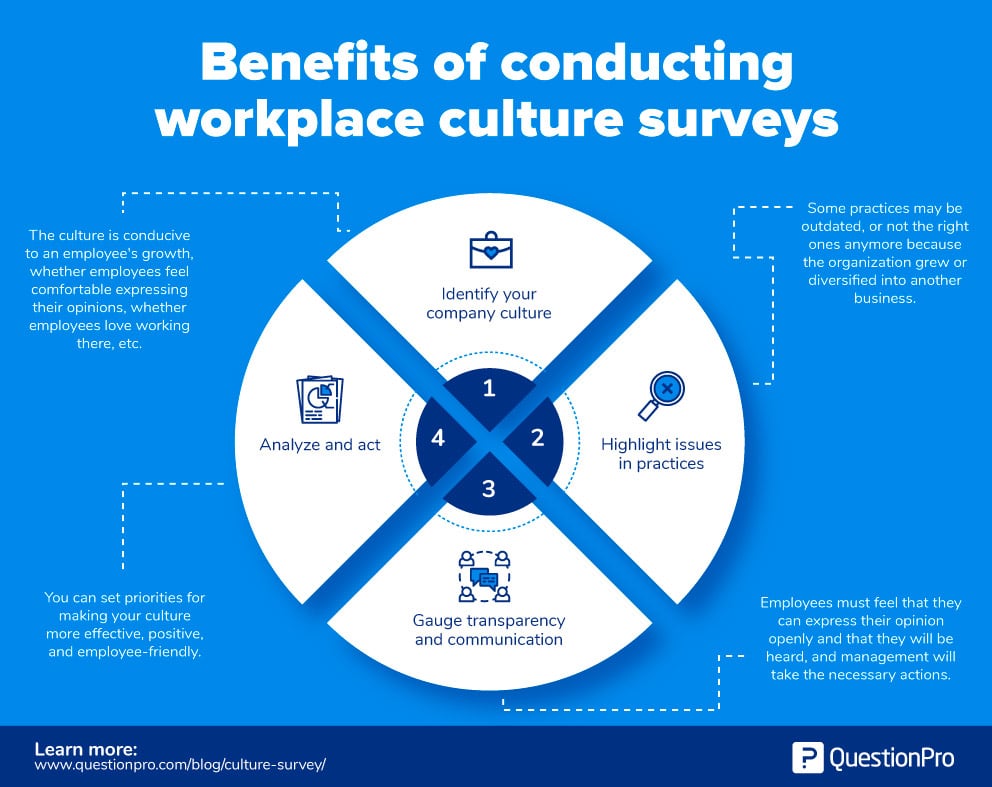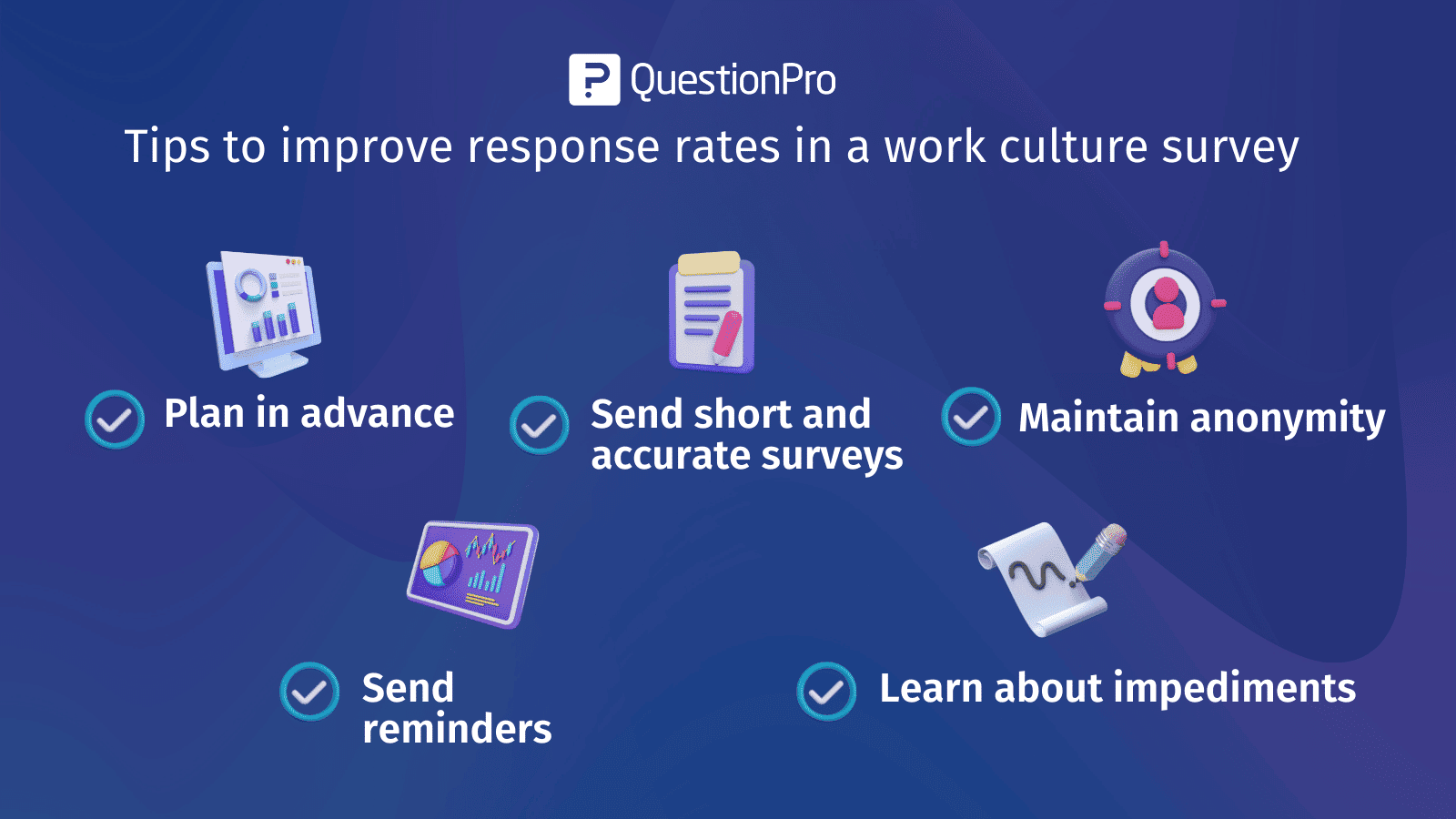
An organization that’s aware of the importance of workplace culture and makes improvements each year will perform better than an organization that ignores or takes very little interest in it. Conducting a work culture survey helps diagnose a bridge, if it exists, between the current company culture and the culture an organization’s management hopes to achieve.
By analyzing employee feedback and perceptions about the company culture at present and aspects of the culture they find appealing, an organization can mend its employee strategies to try and eliminate the gap between the two.
Let’s dive more deeply into the topic of culture survey and its importance in this post, as well as the top 20 employee survey questions and tips that promote development, innovation, and success.
What is a Work Culture Survey?
A work culture survey is a tool to collect insights from employees associated with the organization to assess and improve the business and enhance leadership strategies, future investments, and overall organizational changes. It is an hr survey that evaluates how well-aligned is an organization’s culture with its propagated values and ethics.
“Customers will never love a company until the employees love it first.” – Simon Sinek, Author, Start with Why
An organization should understand what employees think about their culture and what can be improved to make it a better workplace. Every cultural aspect of a workplace directly or indirectly impacts business.
Organizations that intend to create a workplace primarily driven by specific behaviors and focus on developing a conducive culture often rely on culture surveys. Gaining insights into current company culture and analyzing its alignment with the ideal set workplace culture will benefit the organization in terms of better planning, increased performance standards, employee engagement, etc.
Forbes magazine emphasizes how crucial it is to ensure the organization maintains a healthy company culture and improves its status quo.
Internal hierarchy, technologies, skills, and qualities influence actions and assumptions, and the entire system is measured with company culture surveys.
With the inputs provided by each employee, an organization can work towards improving its vision for culture, job roles, job satisfaction, and structure, manage the performance of company-wide teams, and enhance managerial techniques.
Top 20 Company Culture Survey Questions You Can’t Afford to Miss!
If you are running a culture survey in your organization, include these employee survey questions in your questionnaire.
- On a scale of 0-10, how likely are you to recommend our organization to your friends and colleagues due to the culture?
- Satisfied employees will often boast about their company culture amongst their friends and colleagues, and so will dissatisfied employees. But satisfied employees will recommend their network to apply for jobs with your organization which will is profitable for your organization. In contrast, dissatisfied employees will spread negative word about your culture.
Ask this Net Promoter Score question to improve your company’s market reputation by changing company culture.
- Satisfied employees will often boast about their company culture amongst their friends and colleagues, and so will dissatisfied employees. But satisfied employees will recommend their network to apply for jobs with your organization which will is profitable for your organization. In contrast, dissatisfied employees will spread negative word about your culture.
- Are you comfortable with your workplace culture? If yes, Why?
- This type of workplace culture survey question provides information about whether or not your company culture aligns with employee feedback culture and opinions about culture in general. Suppose more than 50% of the organization opines that your culture is uncomfortable and hindering their professional growth.
In that case, you may have to make conscious efforts to make them comfortable. You can do it by either mending a few culture-related rules or by knowing details about the reason for their discomfort.
- This type of workplace culture survey question provides information about whether or not your company culture aligns with employee feedback culture and opinions about culture in general. Suppose more than 50% of the organization opines that your culture is uncomfortable and hindering their professional growth.
- Do you feel respected by your team and the organization?
- An individual grows tremendously in situations where he/she feels respected. This survey question is instrumental in understanding whether the employee’s team respects him/her and how the factor of respect contributes to their productivity.
- Does your manager provide you with timely feedback about your work?
- Feedback is key for an employee’s progress in an organization. Does an employee’s manager provide frequent improvement tips and feedback? Ask this question to understand and analyze how to make employee feedback a constant process.
- Which aspects of the organization can be improved to make it a better workplace?
- Every employee has an opinion about how their culture can improve, and most of them also know details about competitors’ company culture. Include this question to enhance your current workplace culture and improve employee satisfaction.
- How would you define leadership exhibited in this organization?
- Employees in an organization look up to the 360 leadership assessment of the organization. A leader with integrity, discipline, hard-working, intelligence, and similar traits are respected within the organization, and employees want to replicate these traits. So, it is important to ask this question to understand how employees perceive the leadership in the organization.
- How would you characterize this organization’s management style?
- An organization’s management style speaks volumes about how things are conducted within the organization. Good management means good values, which in turn, results in lower employee attrition rates.
- In your opinion, how does this organization define “success”?
- Success is defined differently in every organization. Organizations should clearly emphasize the measures of success to their employees.
- Is your organization dedicated to diversity and inclusiveness?
- An organization that doesn’t discriminate based on gender questions, sex, religious questions, color, or sexual orientation is a safe place for employees to be. This is an important question to ask in your survey to determine if your employees want to work for your company.
- Do you understand how your work impacts the organization’s business goals?
- An organization that helps employees perform better will always experience better employee satisfaction and employee engagement levels. And a workforce that knows how they impact the organization will always be willing to go above and beyond to do good for the organization.
- Do you think the organization operates in a socially responsible manner?
- An organization that is ethical by all means is the first choice for employees. It is important to know if your employees feel the same or not about the organization they work in. If they have a different opinion, it’s time to evaluate yourself as an organization.
- Are you satisfied that the organization’s work is positively impacting the employees in the organization?
- Suppose employees are unhappy working and doing things the way an organization wants them to. In that case, there is undoubtedly a conflict of interest, and an organization must take the initiative to resolve this. So if your employees feel that their organization is negatively impacting them, evaluate immediately!
- Are you satisfied with the overall job security in the organization?
- Job security is important for employees within the organization. This must be addressed if employees fear losing their jobs because of petty issues. This attribute indeed leads to negative work culture.
- Does your organization have a safe working environment for all employees?
- Employee safety should be on top of the agenda for organizations. If female employees work until late at night, proper arrangements should be made for their safety and protection. At all times, employees should feel safe in the workplace.
- Do you think the organization adheres to a zero-tolerance policy against any discrimination?
- Another important question that should be a part of a company culture survey; employees need to know there is a zero-tolerance policy against discrimination.
- Does your manager/supervisor share decision-making power with you?
- It is important employees feel valued at their workplace. If a good manager or supervisor guides an employee in decision-making or gives them responsibility, it shows the greater character of the leadership within the organization.
- Do you have a say in the organization’s policy changes?
- Employees want to feel heard. Organizations must implement steps to ensure their employees feel involved and respected, especially when changing policies that directly affect them.
- Is there a culture of teamwork and cooperation within the organization?
- Teamwork and cooperation are the two attributes that determine an organization’s culture to a greater extent. A positive work culture will strongly exhibit both of these attributes. Ask your employees what they think.
- Are you satisfied with how performance reviews are conducted in the organization?
- Satisfied employees excel because they are challenged and given helpful feedback. The performance review is an important process that every organization follows. However, knowing whether your employees think it is fair is also important.
- Are there any additional questions you would like to add to this survey?
- Always include this question towards the end. Employees have some good insights that can be part of your survey. As you progress, you can amend the existing organization’s culture survey questions—add/delete and collect meaningful feedback.
Are you curious to know about the Employee Satisfaction Survey Template? QuestionPro recently published a blog about it. Explore to learn more.
Benefits of Conducting a Workplace Culture Survey
Now that we know what questions you need to cover in your online company culture surveys, let’s look at why we should conduct them. Here are some key benefits of driving a workplace culture survey.

Identify Your Company Culture
A company’s work culture is neither good nor bad, nor can it be that simple or direct. All organizations are unique, and so is their culture. You need to know or confirm if the culture is conducive to an employee’s growth, whether employees feel comfortable voicing their opinions, whether employees love to work there, etc. Conducting a company culture software survey can give you insights into these aspects and let you know if the employees like the company culture and find it positive.
Highlight Issues in Practices
An organization’s business operations and people processes are based on a set of practices. Practices have been modified and changed over many years. Online work culture surveys will pinpoint practices that need to improve or change.
Understand Transparency And Communication
Employees need to feel that they can voice their opinion openly, that the company will hear them, and that management will take necessary actions. The administration needs to be transparent about business decisions and plans. Employee survey questions will let you know if the organization meets all the required standards for positive work experience and positive company culture.
Analyze And Act in Culture Survey
With specific questions in your work culture surveys, you can identify the most or least prominent behaviors in your organization’s culture. Using these, you can set priorities for making your culture more effective, positive, and employee-friendly.
Tips to Improve Survey Response Rates
Response rates to surveys can have a big effect on how valid and useful your research results are. A low response rate could lead to a biased sample and results that can’t be trusted.
To get a good number of responses, you need to do things to encourage people to fill out your survey. In this way, you can use a few tips to increase the number of people who respond to your surveys.

Plan Well in Advance For Your Work Culture Survey
It is essential to understand that to improve response rates for a culture survey. An organization should create a plan before sending the survey. The management, the partners, and everyone involved should contribute to creating excitement around work culture surveys.Share a social media post or an email to the employees which communicates that a survey to measure culture will be launched soon – activities of this sort should ideally be carried out to ensure the response rates increase.
Send a Short And Accurate Survey
Lengthy surveys bore employees. An organization needs to consider survey fatigue and keep the survey questions as precise as possible for an organization to boost response rates.Maintain Anonymity
Anonymous surveys assure employees that their opinions will not damage their work or reputation with peers and managers. The feedback from employees needs to be kept secret, which will help to improve company culture.Send Reminders
A friendly poke at specific time intervals can do wonders for the response rates.Learn About Impediments
There can be ample impediments for an employee to provide feedback for a culture survey. Understand which aspects keep them from replying to the survey – it can be a lack of time, discomfort with the survey language, or safety survey load time on their computer.Work Culture Survey vs. Employee Engagement Survey
Many organizations and HR managers wonder if they should run culture or engagement surveys in their organizations. Or should we run both? What is the difference? Let us quickly look at key aspects that differentiate culture questionnaires and engagement questionnaires.
Scope
The scope of the study is what differentiates organizational culture surveys and employee engagement surveys. An employee engagement survey will focus on their perception of the organization and their feelings about their job.Questions in an engagement survey will regard employee benefits, the effectiveness of supervisors, promotion opportunities, etc. Culture surveys will focus on how the employee perceives an organization’s ethics, beliefs, values, rules, and ability to judge right and wrong and act accordingly.
Perspective
Engagement questionnaires focus on employees’ day-to-day experiences, assignments, motivation, commitment to work, etc. Organizational culture research delved into values and shared beliefs that guide the behavior and thinking of the entire organization.Measurement
Employee survey questions gauge the factors impacting employee performance. It looks at how they feel about their work, job responsibilities, peer relations, team relations, well-being, work-life balance, collaboration, cooperation, and others.Company culture survey questions examine practices, internal structures, technologies, etc., impacting behavior and employee expectations. Questions cover vision, mission, innovation, leadership style, management effectiveness, teamwork, and conflict management.
Conclusion
Asking thoughtful company culture survey questions and taking action on survey results is important if you want to improve company culture. You can keep track of gaps across the components of your workplace culture by continuously soliciting and assessing employee insights. You can use employee opinion survey questions. Those questions provide valuable insights into employee morale, enabling organizations to make informed improvements and foster an engaged workforce.
The most important thing is to appreciate the input and let the employees know what the leadership is doing to make adjustments.
Ready to create a company culture where everyone can reach their full potential? Learn more about how to get ongoing feedback from your employees and start taking action to make a positive impact in your organization with QuestionPro Workforce.
Frequently Asked Questions (FAQs)
Culture surveys provide valuable insights into employee satisfaction, engagement, and alignment with organizational values. Understanding these factors can help improve retention, productivity, and overall workplace morale.
It’s recommended to conduct culture surveys at least once a year. However, more frequent surveys may be beneficial, especially during periods of significant change or transition within the organization.
Questions may cover various topics, including communication, leadership, teamwork, diversity and inclusion, work-life balance, and overall job satisfaction.
Yes, most culture surveys are designed to be anonymous to encourage honest feedback. This helps employees feel safe sharing their thoughts without fear of repercussions.
Organizations can implement targeted training, improve communication strategies, adjust policies, and create initiatives that align with employee feedback to enhance workplace culture.







